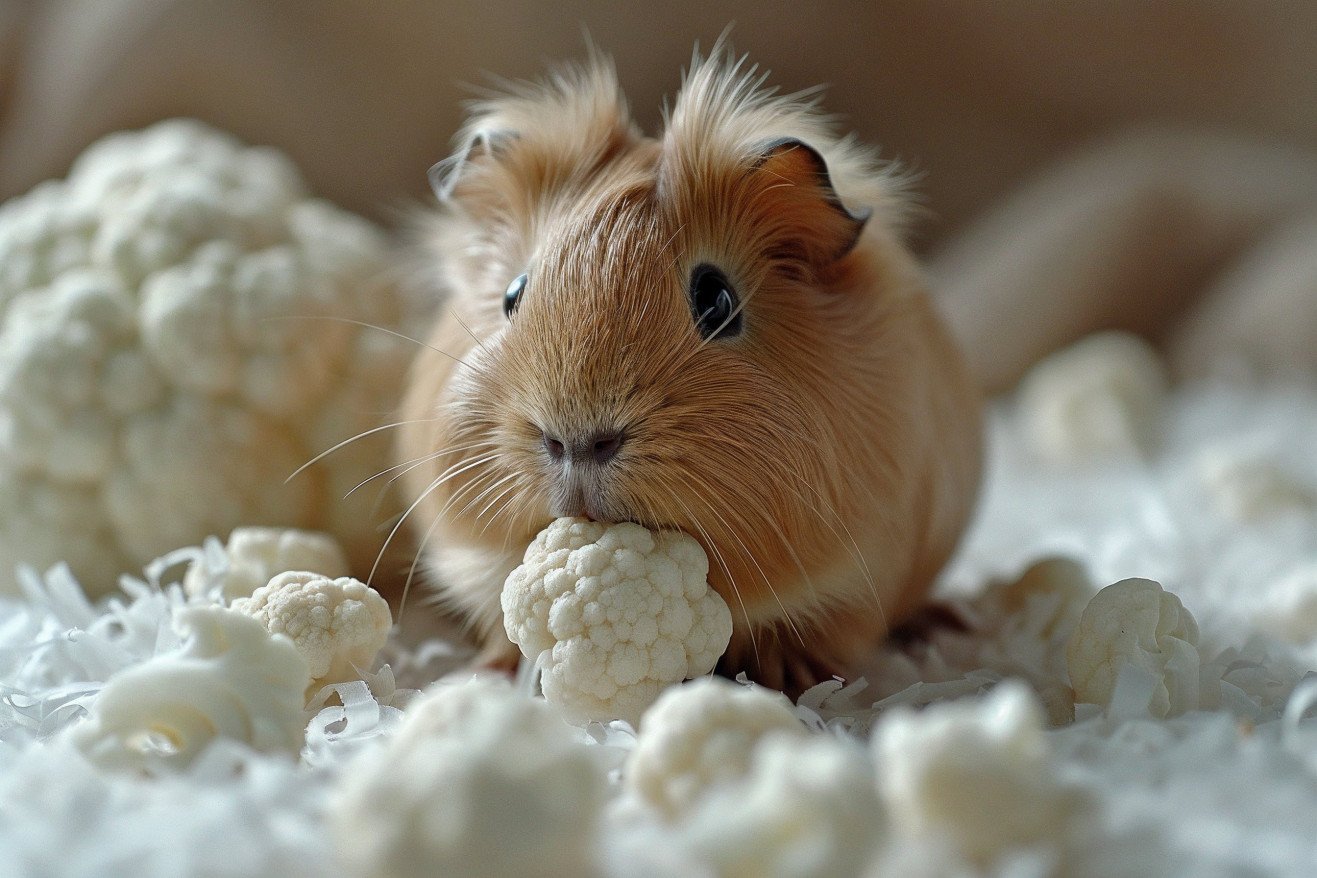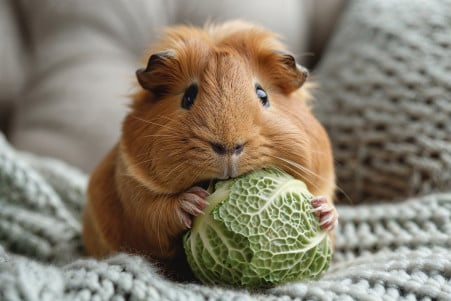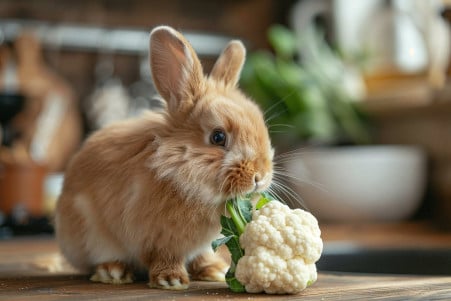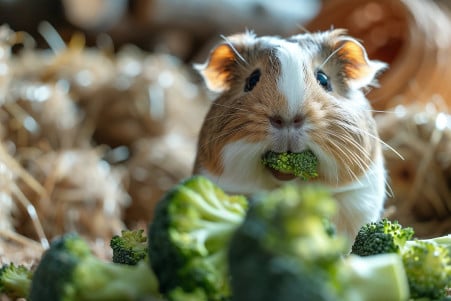Can Guinea Pigs Eat Cauliflower? Nutritional Guidelines and Feeding Tips
28 February 2024 • Updated 27 February 2024

When it comes to feeding your guinea pig, it’s important to offer a wide range of foods, but does that include cauliflower? While it’s safe for guinea pigs to eat cauliflower in moderation and it even provides some important nutrients like vitamin C and K, it can also lead to gas and bloating, so it’s best to introduce it slowly and feed it in small amounts once or twice a week.
This article will review the latest in veterinary nutritional science, such as research on guinea pig dietary needs and how cruciferous vegetables impact their digestive health. It will also cover the pros and cons of guinea pigs eating cauliflower, the nutritional content of cauliflower, and how it can help meet their dietary requirements.
By the time you’re done reading, you’ll know exactly how to add cauliflower to your guinea pig’s diet in a way that’s healthy and safe.
Can guinea pigs eat cauliflower?
What Guinea Pigs Need in Their Diet
It is important to make sure that a guinea pig’s diet meets their nutritional needs. According to the RSPCA, the most important part of a guinea pig’s diet is good-quality hay and fresh grass, which is high in fiber and helps maintain healthy digestion and teeth.
The Humane Society of the United States notes that guinea pigs need to get enough vitamin C in their diet to avoid health problems like scurvy, as they can’t produce this vitamin on their own.
FOUR PAWS International explains that the fiber in hay, which should make up about 80% of a guinea pig’s diet, is important for digestion and dental health and helps prevent teeth from getting too long.
It’s also important to note that new foods like cauliflower should be introduced slowly to avoid upsetting a guinea pig’s digestive system. In addition to hay, a guinea pig’s diet should include fresh leafy greens and a small daily serving of guinea pig pellets to make sure they get enough vitamin C.
A guinea pig’s diet should be diverse but controlled, and nutrient-rich foods like cauliflower can help ensure that a guinea pig’s diet is well-rounded and healthy.
Nutritional Benefits of Cauliflower for Guinea Pigs
Cauliflower isn’t just a low-calorie treat; it’s also packed with nutrients that are important for your guinea pig. NutritionValue.Org says that this cruciferous vegetable is high in vitamin C, which is important for guinea pigs because they can’t produce it on their own.
By giving your guinea pig cauliflower, which contains 51.6mg of Vitamin C per 107g serving, you can help prevent scurvy, a condition that guinea pigs are prone to. Cauliflower also contains 16.6mcg of vitamin K per serving, which can help support guinea pig bone health and blood clotting.
Cauliflower is also a good source of fiber, which can help support a healthy gut, according to Verywell Fit. A 107g serving contains 2.1g of fiber, which can help support gut health and regularity in guinea pigs. Cauliflower also contains antioxidants like glucoraphanin, which may help protect against disease and support overall guinea pig health, says Verywell Fit.
By giving your guinea pig cauliflower, in addition to other vegetables, you can help ensure that they get a well-rounded diet. However, the Mayo Clinic Health System suggests that cauliflower should be given in small amounts because it’s so strong.
A few small florets once or twice a week should be enough to make sure your guinea pig gets the benefits of cauliflower without overdoing it. By giving cauliflower in moderation, you can help your guinea pig’s digestive system get used to this nutrient-rich food.
How to Manage the Risks of Feeding Cauliflower to Your Guinea Pig
Cauliflower is a healthy addition to your guinea pig’s diet that can provide a good source of vitamin C and other nutrients. However, there are some risks associated with feeding cauliflower to your guinea pig that you should be aware of.
One of these is that your guinea pig may experience gas and bloating, which can be uncomfortable. To help prevent this, GuineaDad recommends that you introduce cauliflower to your guinea pig slowly, starting with a small half-inch floret or a single leaf, so that you can see how your guinea pig reacts to it over time.
You should also look out for other signs of an adverse reaction, such as changes in your guinea pig’s poop or other digestive issues. If you notice any of these symptoms, you should consider reducing the amount of cauliflower you’re feeding your guinea pig or removing it from their diet for a short period of time.
In addition, the calcium and phosphorus in cauliflower can contribute to bladder stones if your guinea pig consumes too much of it, so it’s important to feed it to them in moderation.
To make sure that you’re feeding your guinea pig cauliflower safely, GuineaDad also recommends that you wash the cauliflower thoroughly to remove any pesticides, which is another potential risk. By following these steps and monitoring your guinea pig closely, you can help prevent these risks and successfully feed cauliflower to your guinea pig.
In doing so, you’ll be able to take advantage of the health benefits of this vegetable while making sure that you’re not disrupting your guinea pig’s sensitive digestive system.
How Cauliflower Affects Guinea Pig Digestion
The guinea pig’s digestive system is well-suited to the high-fiber plant matter it eats. As zooplus Magazine explains, the guinea pig’s sharp front teeth and ever-growing back teeth are ideal for grinding down hay, and the enzymes in their saliva help break down food. The stomach acidifies the food, which starts the process of breaking down proteins, and the small intestine, which is lined with villi, absorbs the nutrients into the body.
The appendix and cecum push undigested food into these organs to ferment, which allows the guinea pig to extract energy from the fibrous plant matter.
Cauliflower and other cruciferous vegetables can disrupt this system because they contain gas-producing compounds. While it’s important to include these nutritious foods in the guinea pig’s diet, doing so slowly can help prevent gas and discomfort because it allows the guinea pig’s gut bacteria to adjust. Signs of digestive upset to look out for include changes in the consistency of the guinea pig’s poop, a loss of appetite, and a lack of energy.
It’s important to monitor these symptoms when feeding cauliflower and other foods and make adjustments as necessary, including seeking help from a veterinarian.
To help the guinea pig digest these foods more easily, it can be helpful to include foods with a lower gas potential, such as bell peppers or zucchini, which are generally easier for guinea pigs to digest. By including cauliflower with these foods, you can help ensure the guinea pig has a well-rounded diet while minimizing digestive upset.
How to Create a Balanced Diet That Includes Cauliflower for Your Guinea Pig
Because of the need to balance the nutritional content of the foods you feed your guinea pig, it’s important to plan out how you will incorporate cauliflower into their diet.
For example, the Southern California Guinea Pig Rescue suggests that a daily diet might include a cup of mixed greens, such as lettuce and bell pepper, and a half-inch floret of cauliflower. This way, the guinea pig will get a variety of vitamin C–rich vegetables and other nutrients, but won’t get too much of any one vegetable that could cause gas or bloating.
It’s also important to remember that hay is the main source of fiber for guinea pigs and should be the main part of their diet. You should make sure that your guinea pig has access to unlimited hay every day, in addition to about 1/8 cup of guinea pig pellets.
When you create a weekly feeding plan, make sure to add cauliflower in slowly and watch how your guinea pig reacts to it. You should also make sure that you only feed your guinea pig cauliflower once or twice a week and that you alternate it with other safe vegetables, such as zucchini or tomatoes, to make sure that your guinea pig gets a well-balanced diet.
If you follow these guidelines, you can make sure that cauliflower will be a helpful, rather than harmful, addition to your guinea pig’s diet.
Conclusion: Can Guinea Pigs Eat Cauliflower?
So, what does this all mean for the role of cauliflower in a guinea pig’s diet? It seems that cauliflower can be a healthy part of a guinea pig’s diet as long as it is fed in moderation. The vegetable is a good source of important nutrients like vitamin C and fiber, which can help with digestion and other bodily functions.
However, it’s important to introduce it slowly to avoid digestive issues like gas and bloating.
Pay attention to your guinea pig’s reaction to cauliflower to make sure they don’t have any adverse effects. Guinea pig owners who are paying attention will be able to tell if their pet is uncomfortable or having trouble digesting a new food.
It’s also important to make sure that your guinea pig’s diet is well-rounded, with cauliflower making up only a small part of what they eat each week in addition to a constant supply of hay, fresh vegetables, and specially formulated pellets.
In conclusion, make sure that you are keeping your guinea pig’s diet in balance and paying attention to how they react to new foods. By doing so, you can add cauliflower to your guinea pig’s diet in a way that will benefit their health without causing any problems.


